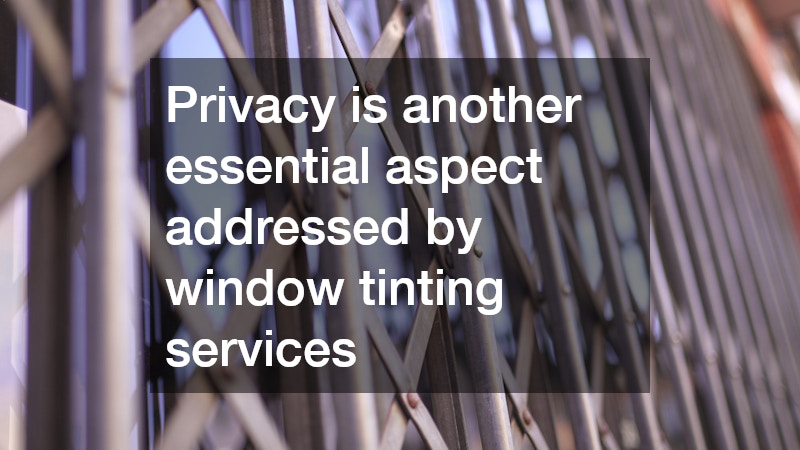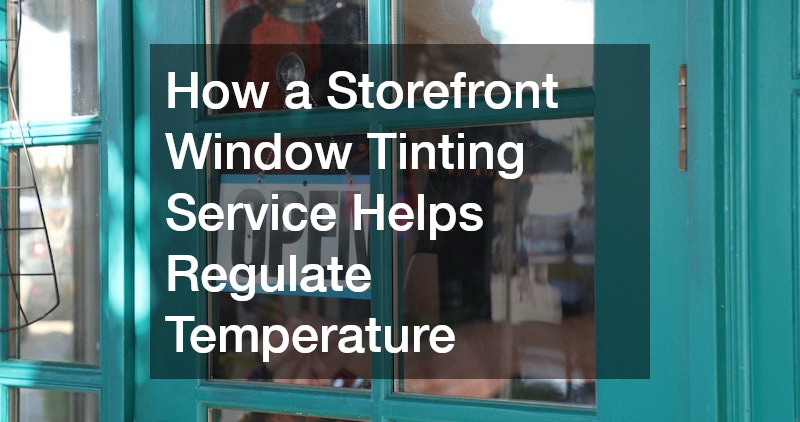There are many benefits of hiring a storefront window tinting service for regulating temperature, including enhancing comfort and improving energy efficiency. As competition grows in the retail landscape, store owners are continuously looking for innovative ways to improve the shopping experience for customers. Among these innovations is the adoption of window tinting, which addresses not only aesthetic concerns but also the critical aspect of temperature control.
Effective temperature management is crucial for any retail outlet. Excess heat can create an uncomfortable atmosphere for shoppers, discouraging them from spending time in the store. By investing in window tinting, storefronts can ensure a pleasant environment, positively impacting customer satisfaction and retention rates.
Overall, window tinting is not just a cosmetic enhancement; it’s a strategic investment that can lead to substantial savings and improved operational efficiency. In the sections that follow, we will delve deeper into the intricacies of how window tinting significantly benefits storefronts, transforming them into more comfortable and energy-efficient spaces.
The Purpose of Window Tinting
Window tinting serves multiple purposes, including reducing glare, enhancing privacy, and regulating indoor temperatures, which contributes to a more comfortable shopping environment. Glare from direct sunlight can distract customers, making it challenging for them to focus on products and displays. By applying quality window film, this issue is significantly minimized, helping customers to have an uninterrupted shopping experience.
Privacy is another essential aspect addressed by window tinting services. Storefronts often feature large windows and glass doors that expose interior layouts and merchandise to the outside world. With the right tint, businesses can maintain a level of privacy, ensuring that while customers can see inside, they aren’t overly exposed to outside scrutiny.
Moreover, temperature regulation via window tinting enhances customer comfort, promoting longer visits and, potentially, increased sales. A comfortable environment encourages customers to linger longer and explore more products. This increased dwell time directly correlates with the likelihood of making a purchase, highlighting the multifaceted benefits of effective window tinting.
The Heat-Reduction Benefits of Window Tinting
Window tinting helps reduce heat by blocking a significant percentage of solar rays, thereby lowering the temperature within the store, minimizing the burden on cooling systems. Many studies suggest that commercial window films can reject up to 79% of solar heat, drastically cooling indoor climates. This reduction means that air conditioning units do not have to work as hard, leading to increased efficiency.
The process of heat reduction is crucial for maintaining a consistent temperature throughout the day. In storefronts, fluctuating temperatures can lead to discomfort among shoppers, driving them away. When window tinting is applied, it acts as a thermal barrier, absorbing and reflecting solar heat rather than allowing it to penetrate through the glass.
Consequently, by providing relief from excessive heat, window tinting not only enhances the immediate shopping experience but also supports the long-lasting functionality of cooling systems. A cooler store environment reduces wear and tear on HVAC equipment over time, leading to fewer repairs and reduced operational costs. All these points drive home the importance of window tinting in managing heat effectively.
The Right Tinting for Temperature Regulation
There are several types of window films, such as reflective, ceramic, and dyed films, each offering different levels of heat rejection and UV protection suitable for storefronts. Reflective films are particularly effective at bouncing back sunlight, making them an excellent choice for stores located in sunny areas. Such films can cut down glare significantly while providing a stylish aesthetic that appeals to customers.
Ceramic films, on the other hand, offer a high level of thermal insulation without the reflectiveness that might alter the storefront’s appearance. This type of film is ideal for stores that value natural light but want to minimize the heat gain associated with it. By filtering infrared light while allowing visible light to pass through, ceramic films strike an excellent balance for comfortable shopping environments.
Dyed films serve a slightly different purpose, mainly focused on enhancing privacy and UV protection. While they are not the most effective in terms of heat rejection, they help in protecting merchandise from fading due to UV exposure. Store owners need to consider their specific needs and environmental conditions when selecting the most appropriate type of window film for their establishments.
The Long-Term Benefits of Storefront Window Tinting
Long-term benefits of using a window tinting service include increased comfort for customers, extended lifespan of furniture and merchandise by blocking harmful UV rays, and potential increases in sales due to a better shopping environment. Customers favor environments where they feel comfortable and relaxed, enhancing their overall shopping experience. Consistent temperature regulation ensures that consumers can focus on purchasing rather than on discomfort.
Furthermore, many types of window tints are designed to deter UV rays, which can cause fading and degradation in materials over time. By protecting furniture and products, businesses can reduce replacement costs and ensure their displays remain vibrant and appealing. This preventative measure is critical for maintaining the aesthetic appeal of any retail setting, allowing them to sell at higher prices for longer periods.
Additionally, a well-maintained storefront environment translates into higher sales. Happy customers tend to spend more time browsing and are usually more inclined to make purchases. In essence, exploring the long-term benefits of window tinting illustrates its multidimensional role in enhancing business effectiveness, making it a worthy investment in any competitive retail landscape.
Storefront window tinting services are a valuable investment that not only helps regulate temperature but also enhances the overall shopping experience. The multifaceted benefits of reduced glare, increased privacy, and improved energy efficiency solidify the importance of window tinting in modern retail environments. As businesses continue to prioritize customer satisfaction and environmental responsibility, window tinting stands out as a key solution that addresses critical operational challenges.




